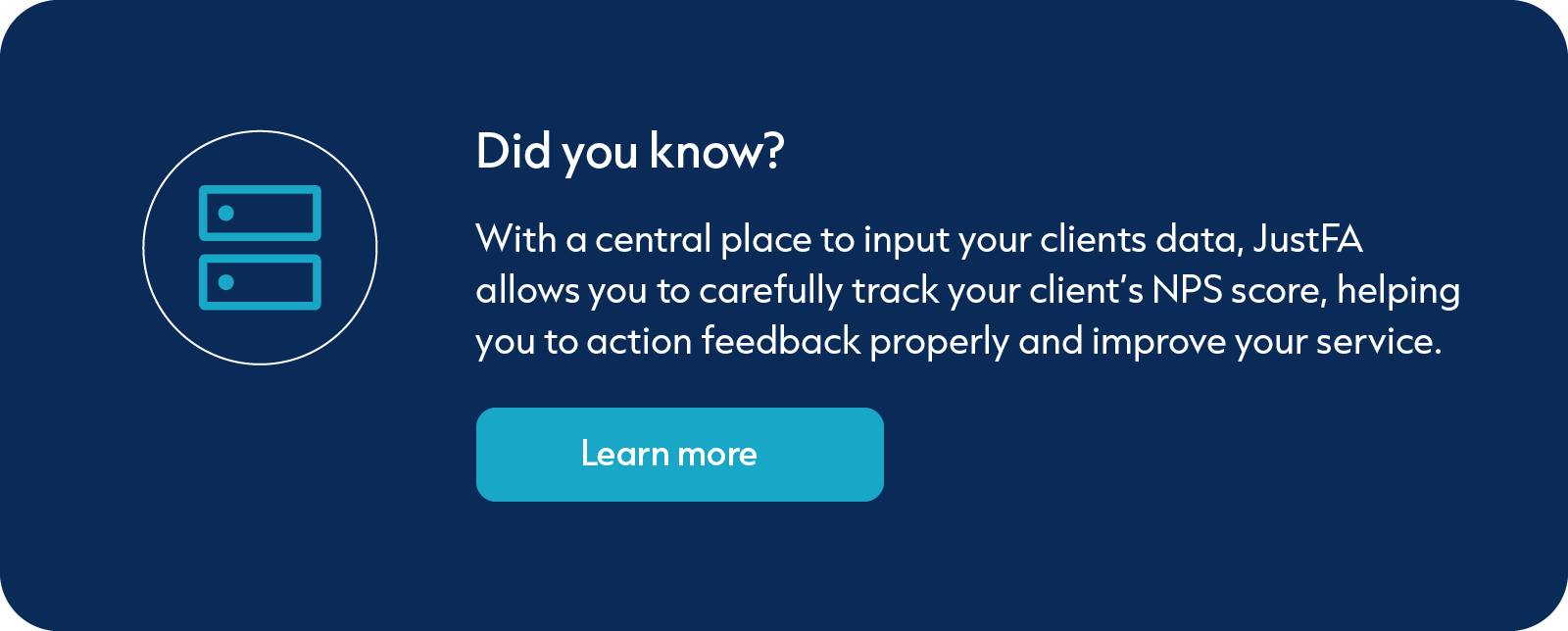If you produce a word cloud of the top 25 words used in the FCA’s ten key questions for firms to consider in advance of the 31st July deadline, you can easily see the thrust of the whole concept.
We produced one here.
Unsurprisingly, protecting consumers is the most salient theme, cutting across products, services and support.
.jpg)
But there are also numerous references to the need for objectivity - data, testing, assessment and MI; effective communications, fair outcomes and value.
You might think that these more qualitative issues are easier to address, as they are subjective, but that’s not the case.
It’s possible, and under Consumer Duty required, to prove that your communications are effective, and the best way to ensure this is through the use of surveys.
Most advisers know what an NPS score is, but few realise the full value in utilising this method to A) record and action clear feedback from clients and now B) maintain compliance with the Consumer Duty.
In this blog, we’ll underscore the potential of the Net Promoter Score (NPS) system, and the utility of gathering feedback and satisfaction data, beyond simple Consumer Duty compliance.
Net Promoter Score
Surveying your clients to collect data for analysis is one of the surest ways to demonstrate compliance with new Consumer Duty regulations and will give you by far the greatest insight than relying solely on anecdotal feedback from those clients who happen to offer it.
A Net Promoter Score focuses on something which almost every adviser wants: referrals.
Referrals in numbers rarely just come in out of the blue, they need to be sought out, so some form of mechanism is necessary to pull them in.
Clients are invited to assess, on a scale from 0 to 10, the probability of them recommending your firm or services to someone they know. Once a substantial number of responses are accumulated, they are classified based on their score.
Scores ranging from 0 to 6 indicate 'Detractors’. These are clients who are dissatisfied and unlikely to vouch for your business. Scores within the 7 to 8 spectrum represent 'Passives' - clients who are probably content but not particularly thrilled about their experience. Meanwhile, scores from 9 to 10 are assigned to your 'Promoters’.

‘Promoters’ are clients who are satisfied with their experience and are likely to refer you to their network.
The calculation of your Net Promoter Score (NPS) involves a simple subtraction operation.
First, set aside the Passives, then subtract the percentage of Detractors from the percentage of Promoters. For instance, if you have 5% Detractors, 30% Passives, and 75% Promoters, your score would be 75 – 5, which results in an NPS of 70. This figure then serves as a concrete measurement of your firm's customer satisfaction and loyalty.
A Net Promoter Score is a perfect way to turn feedback into hard data that demonstrates not only that your firm is compliant but also will give you a ‘heads-up’ as to how many of your clients are truly satisfied with the products and services offered.
We recommend the following general tips to keep your clients engaged with the process and ensure efficacy.
1. Ensure anonymity - Giving your clients the freedom to express themselves candidly is paramount. If their identities are protected, they're more likely to share honest feedback about your firm and pinpoint areas that could benefit from enhancement.
2. Keep it concise - Avoid turning your survey into an arduous task or a lengthy interrogation. Strive to make it as brief as possible; the more succinct the survey, the more responses you're likely to receive.
3. Don't confine your understanding to a numerical score ranging from 1-10 - The most insightful revelations often stem from the descriptive responses provided by your clients. Offering your respondents the opportunity to share in their own words will provide you with a more nuanced and comprehensive understanding of their experience.
Going above and beyond for your clients
.jpg)
Asking for feedback will always feel a bit needy. But Consumer Duty aside, when executed well, acquiring feedback can come across as professional, considerate and purposeful, helping you to build a better experience for clients.
The evidence you obtain can also provide social proof to the increasing number of prospects who check you out first online, even when referred by another client. We all know how important online reviews have become for consumers in any sector, and this is a trend that shows no sign of slowing, even in the financial service industry.
Adding in something which just one or two clients have asked for is a classic mistake we have all made over the years and one to be avoided.
It’s pretty much impossible to evidence that you are operating in compliance with the Consumer Duty unless you have reliable, objective data. Don’t be fooled when reading words like ‘fair’, ‘good’ and ‘satisfied’, into thinking that you will sail over the Consumer Duty bar because this shows your clients love you.
You need to be prepared to convert opinion into data, show that you understand what it means, and that you have the ongoing ability to monitor and tweak it.
The technology that makes the Consumer Duty easy
With the Consumer Duty just around the corner your firm must ensure it has the right technical set-up, not just to guarantee compliance, but to seize new opportunities.
Core to this will be the right platform.
It should allow you to put your clients on the right service plan that works for them and let you carefully track NPS scores and data, helping you to action the feedback that is essential to improving your service.
It should enable you to apply varying levels of communication, whether that’s completely remote or hybrid, to different clients who have individual requirements and service demands.
JustFA is the platform that gives all of the above, and much more.
Book a demo today and learn how we can keep your firm compliant, whilst increasing referrals, client satisfaction and firm value.



